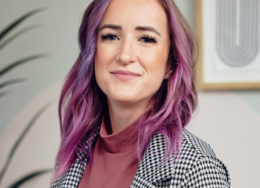Episode 272 02 Jul, 2025
Avoid the Dreaded Board Complaint: Top Clinical Risk Management Tips for Group Practices with The Working Alliance
-
 With Karen Pavlidis and Fran Schopick
With Karen Pavlidis and Fran Schopick

Could your group practice survive a board complaint?
If you’ve ever felt anxious about protecting your license – or the licenses of your team – this episode is a must-listen.
In this episode, I sit down with Karen Pavlidis and Fran Schopick of The Working Alliance to talk about a topic that keeps a lot of group practice owners up at night: how to proactively reduce risk and avoid board complaints.
We dig into the biggest mistakes practice owners make when it comes to practice policies, the role of strong therapy documentation, and why a well-written therapy informed consent example is one of the most important clinical risk management documents in your practice.
In this episode, we cover:
- The one red flag that gets ignored most often by clinicians – and how it leads to board complaints if left unaddressed.
- Why your therapy informed consent example might be missing critical language (and what it needs instead).
- The biggest mistake group practices make with practice policies – and how it opens the door to liability.
- How tech is making it too easy for clinicians to skip key therapy documentation steps that protect everyone.
- What a team culture rooted in clinical risk management looks like – and how to build one starting now.
If you’re a practice owner wondering what really goes into strong clinical risk management, you’ll walk away from this episode with actionable steps to protect your practice, your team, and your clients.
LINKS:
Need extra support? Join The Exchange, a membership community just for group practice owners.
The Group Practice Exchange Programs + Courses
The Accountability Equation™ Quiz
The Accountability Equation Book
Group Practice Forecasting Support GPT
CONNECT WITH MAUREEN HERMANN & THE GROUP PRACTICE EXCHANGE:
CONNECT WITH THE WORKING ALLIANCE:
Document Packages – Use coupon Code TGPE25 for 25%!
Free Download: 11 Tips to Help You Avoid a Board Complaint… and Sleep Better at Night!
Contact them HERE for team trainings around building awareness about best practices in risk management
SPONSORS:
TherapyNotes: An EHR software that helps behavioral health professionals manage their practice with confidence and efficiency. Go to therapynotes.com/r/thegrouppracticeexchange for two free months!
GreenOak Accounting: An accounting firm that specializes in working with group practices. Mention TGPE to get $100 off your first month!
Transcript: Karen Pavlidis and Fran Schopick
[00:00:00] Karen Pavlidis: I feel really strongly that when we are using best risk management practices, we’re gonna have happier clients because we’re only gonna have a risk management problem when the client’s unhappy. So to me that says we didn’t do our job clinically. And so if we’re empowering the client by informing them about what to expect and the bounds of what we do and don’t do.
[00:00:24] Karen Pavlidis: That’s going to pave the way for much smoother clinical care.
[00:00:31] Maureen Hermann: Welcome to the Group Practice Exchange Podcast, where we talk about all things related to group practice ownership. I’m your host, Maureen Hermann.
[00:00:42] Maureen Hermann: Therapy Notes is changing the game for mental health professionals. It’s an all-in-one EHR practice management and billing platform that actually makes running your practice easier from secure client messaging and scheduling to notes and billing. Everything’s in one place and their 24 7 customer support is truly unmatched.
[00:00:58] Maureen Hermann: You get a real person, a live human every single time you call their latest update. Therapy Fuel is a total time saver. It’s a built-in AI tool that helps you get through documentation faster. Think progress notes from transcripts or summaries, contact notes created from secure messages. And automated summaries of client history forms, users are already saying that it’s saving them hours every week.
[00:01:20] Maureen Hermann: Other new features worth noting is automated recurring payments for clients, electronic billing for secondary insurance, and a growing outcome measures library to make tracking progress even smoother. If you’ve been on the fence, now’s the time to try it. Head over to therapy notes.com. Click start My Free trial, and use the promo code TGPE to get your first two months for free.
[00:01:42] Maureen Hermann: See why so many therapists trust therapy notes to support their practice, including me. Struggling with your practice’s finances. Let me tell you about Green Oak Accounting. Green Oak is the industry leader in mental health accounting, and they know exactly what it takes to help your practice thrive, especially when you’re scaling up.
[00:01:59] Maureen Hermann: Green Oak is set apart from the rest by their deep industry knowledge and top-notch advisory and CFO services. Plus they offer traditional accounting services like bookkeeping, tax prep, valuations, and so much more. Here’s what’s in it for you. Peace of mind, financial clarity, and the potential to significantly grow your practice and profits.
[00:02:20] Maureen Hermann: In fact, green Oak has the most impact with practices looking for financial guidance when leveling up thanks to their CFO services, and they’re not just about crunching numbers. They also offer a mix of resources like the Therapy for Your Money podcast, the Profit First for therapist book and self-guided courses to keep you informed and empowered in growing your practice.
[00:02:43] Maureen Hermann: Ready to transform your practice’s financial health. Visit www.greenoakaccounting.com to explore all that they have to offer Green Oak accounting. Your partner in financial prosperity.
[00:03:00] Maureen Hermann: Hey everyone. Welcome back to another episode of the Group Practice Exchange Podcast. Today I have Karen Pavlidis and Fran Chopik on, and we’re gonna be talking about the top tips for reducing risk of a board complaint specific to group practices and group practice owners. Karen Pavlidis, the owner of Child and Teen Solutions in Seattle, has partnered with Fran Schopick, who’s a JD and MSW, and does risk management as an attorney, and they formed The Working Alliance, which is a resource for both solo and group practice owners.
[00:03:34] Maureen Hermann: Their primary offering is a comprehensive informed consent. So a great topic, and I’m very excited to have you guys in. So welcome. Thanks, Maureen. Thank you. Yeah.
[00:03:44] Fran Schopick: We just wanna say before we get started that everything we talk about today is for informational and educational purposes. It doesn’t create an attorney-client relationship or a, or a counselor client relationship or a supervision relationship.
[00:03:57] Fran Schopick: This is just information. Think of it. Sort of as a book on a shelf. You can look at the information, you can hear the information, you can discard or use it to the best of your ability. Awesome. We just wanted to be clear about that. Thank you. Yeah,
[00:04:07] Maureen Hermann: so I know board complaints or one of the things that when group practice owners are starting to hire people is usually one of the first things that they start to get really anxious about because.
[00:04:18] Maureen Hermann: If they’ve been solo providers for a while, it’s, I don’t know if it’s just a confidence thing where they feel less anxious about board complaint issues until they start to bring on other clinicians because they realize there’s a lack of control, a lack of ownership in some sense as other providers come in.
[00:04:36] Maureen Hermann: And so I wanted to get your feedback on what you see as the most common. Reasons that therapists practice owners face board complaints or their clinicians in their practice, what are kind of the most common things that you’re seeing?
[00:04:49] Fran Schopick: I just wanna say, one of the things I think that can lead to a board complaint is when practitioners often feel that there’s something off or something wrong, but they ignore it.
[00:04:58] Fran Schopick: So a big thing about avoiding board complaints, I think, is to pay attention to what they know. You know, this is as a group, therapists are very gifted in terms of sensing non-verbal cues, but they also learn to ignore them so that they can serve the client and put the client first, which is also important.
[00:05:16] Fran Schopick: So it’s a balancing act that people need to accustom themselves to. Karen, were you gonna say something? Oh
[00:05:20] Karen Pavlidis: yeah, I was gonna say, well, I think Fran and I talk a lot about awareness and how that’s probably gonna be, maybe we hope one of the biggest takeaways is the importance of awareness. But I so relate to that vulnerability when I really didn’t, I.
[00:05:35] Karen Pavlidis: Think about the potential of a board complaint. Knock on wood, it hasn’t happened until I started a group practice, and just that scaling up creates so much vulnerability, and especially for those of us working with children and families, and that’s the focus here. But Fran and I were talking about this and how the source is.
[00:05:56] Karen Pavlidis: Probably the same as for solo, but the vulnerability is greater because of the size. But one of the biggest vulnerabilities is working with high conflict divorce. And when we talk about board complaints, Fran and I talk a lot about like, let’s just not even have the rupture to begin with. Because even if that doesn’t lead to a complaint, it’s.
[00:06:18] Karen Pavlidis: So hard, but with the high conflict divorce dynamics, you know, we’re talking about history and I think it’s important to ask this and as part of client screening so that we know when it’s there, so to define it. Clearly ask the questions and with the therapist, like for example, you might have a lovely play therapist who’s like amazing with kids, but if a case with those dynamics is assigned to that therapist, things could go sideways.
[00:06:49] Karen Pavlidis: And so it would be important for anyone working with these dynamics that they have. A training background in domestic violence, family systems, working with personality dynamics and be, really have probably extra support and consultation within the clinic.
[00:07:05] Maureen Hermann: Something I was thinking about as you’re talking is that a lot of practice owners don’t engage in the prep work.
[00:07:12] Maureen Hermann: Maybe is is the word I wanna use for when they bring on clinicians to have some sort of. Policy around what should they do if they have this feeling right. Fran had said like, usually they have a sense that something’s not right, but they don’t act on it. They don’t inquire on it, and I think group practice owners have a duty to put policies in place that help clinicians know what should they do if they feel like something’s kind of going awry, like what are the steps that they should take, whether it’s.
[00:07:45] Maureen Hermann: Going to a supervisor and saying, Hey, this is what I’m experiencing or what I’m sensing, or whatever, and I think a lot of practices just don’t have those in place and really put maybe a little too much ownership on their clinicians to just know what to do when those things are happening.
[00:07:59] Karen Pavlidis: Yeah. We talk all the time here at, so Katz is the name of my clinic for Child Indian Solutions, and we talk at cats all the time about how this lightest whiff.
[00:08:12] Karen Pavlidis: The slightest. And so that means really tuning into ourselves like Fran was talking about earlier, and listening to bring it to whoever leadership is for that person. And we also talk a lot about if you’re gonna craft an email, whatever the leadership should be co crafting. That messaging. And I think sometimes as leaders we might wanna be like, oh, we don’t wanna micromanage, but here is a time for that and also for the clinician, even if a clinician has like an oops, you know that they know that they don’t have to hide it, you know that they can come to leadership and know that like there’s no blaming, there’s support.
[00:08:53] Karen Pavlidis: We’ll help you troubleshoot. So key.
[00:08:56] Fran Schopick: But it’s really also, you know, you’ve sort of fast forwarded to two big issues. One being the awareness that Karen mentioned, and the other is the disclosure forms because I can’t tell you how many times I’ve spoken to clients who have board complaints, and when I asked them, when did you get a sense that something might be awry?
[00:09:13] Fran Schopick: They picked it up pretty quickly. But they didn’t wanna act on it. They felt that it was being judgemental, or they felt that they wanted to have unconditional positive regard, or that they wanted to have client self-determination, or that they wanted to be empathic, and so they ignored what they knew. So if they’re in a, if they are in an agency, if you have a group practice where people are.
[00:09:34] Fran Schopick: As Karen was saying, able to bring it up, but it’s not just about the words. Like it wouldn’t just be if for somebody to hand you a template for a a letter, it’s going through the dynamics that the person is experiencing and has observed and really having that letter be a result or be a product of that awareness and knowledge and processing.
[00:09:55] Fran Schopick: And likewise, one of the biggest things that comes up with the disclosure forms is that people think that it’s about getting a signature.
[00:10:02] Maureen Hermann: Right.
[00:10:02] Fran Schopick: They think that, oh, here’s this thing that the head of the agency or the group practice has given us. And here, would you please sign so we can get onto the quote, real work.
[00:10:10] Fran Schopick: Mm-hmm. And when you take on a client. You’re in a position of some vulnerability and in some ways your anxiety is a good thing. You should be anxious. You know what I mean? You should be thinking about those things, and your anxiety can sort of give you the strength or the courage or whatever you wanna call it, to really address those issues.
[00:10:27] Fran Schopick: But when you have a disclosure form and you just hand it over, it’s really important for the practitioner to understand what’s in it. What it says and what the precursors could be. You know what the signs, it doesn’t have to be a full blown problem. It could just be the precursor, and then of course to also minister it throughout the course of therapy so that you can know and have confidence that you’ve expressed these things.
[00:10:50] Fran Schopick: It can be very hard, for instance, if a client comes on to you sexually, you know, if a client comes onto you. You’ve never discussed it. You can feel like you’re a deer in the headlights, sort of blindsided. But if you’ve discussed it and if you’ve put it in the disclosure form and you feel confident about what that means or to you with the therapy, it’s a much better result and it’s a much better experience.
[00:11:11] Maureen Hermann: So to that point, you mentioned that as a way to sort of be proactive. What are some of the steps that group practice owners can make as they’re hiring clinicians that help reduce this risk of a board complaint?
[00:11:26] Fran Schopick: Right. Well, Karen, did you wanna speak to that?
[00:11:28] Karen Pavlidis: Yeah, so Brandon and I talk a lot about having this team culture of awareness, and so I think that’s important to discuss in the interview process because not.
[00:11:39] Karen Pavlidis: Everybody is gonna be on board with thinking like a risk management specialist, and that’s what we want. And some providers feel like risk management, they might feel like is CYA? Mm-hmm. And when in fact, I feel really strongly that. When we are using best risk management practices, we’re gonna have happier clients because we’re only gonna have a risk management problem when the client’s unhappy.
[00:12:07] Karen Pavlidis: So to me, that says we didn’t do our job clinically. Yeah. And so if we’re empowering the client by informing them about what to expect and the bounds of what we do and don’t do. That’s going to pave the way for much smoother clinical care. So I think it’s, it’s important to screen that people are comfortable, are interested, wanna have those discussions.
[00:12:31] Karen Pavlidis: And we even build this in too. We have monthly meetings about risk management issues. And so At cat. At Cat, yes. It’s like when people love. To have employees who love that. So
[00:12:43] Maureen Hermann: I was gonna say, I, uh, I think Fran, you had sort of mentioned this, is that a lot of clinicians view the intake process where they’re going through the informed consent as like a thing to breeze through.
[00:12:56] Maureen Hermann: And especially, so I’ve had a group practice for a little, almost 15 years and because technology has evolved so much, when I first started my group practice, it was pen and paper and they would do it with me. And now people are able to do it through like their EHR online ahead of time. And I know a lot of practices where as long as it’s filled out, like they just jump right into the therapeutic part of the intake process and never go through those disclosures and the consents and so.
[00:13:27] Maureen Hermann: I wanna hear your guys’ thoughts on one, a well-crafted, informed consent, what that process looks like and how it protects you legally and ethically, and your clinicians as well, because I think tech plays maybe a little bit of a role in allowing clinicians to remove themselves from that part of the process and obviously open themselves up to issues.
[00:13:49] Fran Schopick: Well, yeah, I mean, I think the first piece of it is to understand. A disclosure form is your friend. You know that it’s there to protect you. It, it really is. It’s there to protect the client, but it’s also there to protect you. Mm-hmm. So the floor of what you need to have is what your state requires. Every state has different things.
[00:14:07] Fran Schopick: There might be generalisms that are in common, but every state has different things and you wanna make sure that you have what your state requires. Mm-hmm. Then you wanna make sure that you have the information that about your particular practice, like, you know what? Philosophy you have or what practice, what modality you use.
[00:14:23] Fran Schopick: And then there are a bunch of things that you have a lot of choices about. You know, you have choices about how you work with gifts or touch or sort of humanitarian or client centered approach as opposed to E MDR R, not, not that e MDR R is a client oriented, but different from client centered and to really understand what you do.
[00:14:42] Fran Schopick: So then the form itself, you want it to include those things. You never wanna make promises that you can’t keep. Don’t put aspirational things in the disclosure form that you may not be able to maintain and understand the limitations of what you can say. A lot of people will say, for instance, everything you say to me, it will be confidential.
[00:15:02] Fran Schopick: That’s simply not true. I mean, there are so many, there are exceptions under the least of circumstances. There are mandatory reports about abuse or neglect of a child or a vulnerable adult in most states. But even in addition to that, there are things that if there’s a divorce, the records might be subpoenaed or you might have choices about ground rules.
[00:15:21] Fran Schopick: You know, telling people whether or not you work, as Karen was saying, with certain high conflict dynamics. And so these are things that. Are important for the therapist to understand, really understand, and also to communicate to the client. The clients are coming to you because they have a problem. If they could have fixed the problem themselves, they would’ve.
[00:15:40] Fran Schopick: So they’ve come to you and they need your help. There is gonna be some pressure possibly on the part of the client towards you to get to the quote, real work. I don’t wanna do, I already signed it. Why are we bothering about this? Mm-hmm. And I always used to say, you know, when I was doing research particularly, or even clinical work, I would say to people, this is really important to go through.
[00:15:58] Fran Schopick: I wanna be sure. For me, I wanna be sure that you understand this, and I wanna be sure that we’ve covered certain topics. And then I might say something like, if I were in your position, I’d wanna know this. Or something that a lot of clients ask about is that, and to be able to enable or even create a conversation around it that is oriented toward their needs.
[00:16:17] Fran Schopick: It’s a delicate balance because as I said, you need to know what they’re there for. But another thing is to know if the client is really seeking therapy. They may be seeking a place to vent or which can have therapeutic value. I’m not saying that it doesn’t, but it probably won’t be medical necessity to just vent.
[00:16:34] Fran Schopick: Or you might have a couple come in who just wanna vent at each other and have you there to witness it or to approve of that. So you need to make sure that what you have to offer is what they want. Because if what you have to offer from a starting point, if you have a self-examining approach and the client is looking for something less self-examining, or if their tendency is to externalize and blame, and you are all about accountability, you wanna know that because you do not wanna take on a client whose goals are different from what you can provide.
[00:17:03] Fran Schopick: And to have confidence in this conversation if you really understand it. You’ll wanna have that conversation. But I know there are a lot of clinicians who feel that it’s an imposition on their clients and they don’t wanna have to do that. And they wanna do everything they can that the client wants. And I think that that there are certain really, actually boundary problems implied there.
[00:17:22] Maureen Hermann: I appreciate you saying all of that and. I know that I put in the intro about this informed consent, you know the name of it better than I do documents, right? That you guys have. Can you talk about that and, and how this helps group practice owners or in what way you help group practice owners from that perspective?
[00:17:42] Maureen Hermann: Yeah, right.
[00:17:42] Fran Schopick: Well, what’s unique about what we provide is that. We provide a template that people can use, but there are certain people who have different philosophies around what they might do. So we provide examples of what they can use, but most importantly, we explain why it’s important. So. Now I realize there’s some people who just want a template.
[00:18:01] Fran Schopick: They just, just gimme a template and I’ll be, I’ll be off, I’ll be fine. And they can have that. They can do it that way if they want. They can use the product that way. But they also can look at the sort of narrative explanation of why this is really important. And we realize that some people learn differently.
[00:18:17] Fran Schopick: Some people learn well visually, and they like to read a lot, and some people learn better orally or auditorily. And so we also will be having sessions where people can ask questions that we can explain. Karen, did you wanna talk more about that though?
[00:18:29] Karen Pavlidis: Oh yeah. I mean, I could talk about, yeah, I think you covered a lot.
[00:18:33] Karen Pavlidis: Hit a lot of the important points. That’s one of the things Fran mentioned that I really like about our process is that the educational discussion, so just at a practical level, we have a core disclosure, which is. Meant to, at least for Washington State, we can only speak to that, the core requirements.
[00:18:56] Karen Pavlidis: But then we also have quite a lot a large bank of add-ons and so. Anyone who gets the package has these add-ons and each add-on has, and this is what I feel like is the most valuable part. You know, some people are looking for the wording, but it really is about like, ask yourself this, ask yourself that, and it.
[00:19:16] Karen Pavlidis: Guides providers to get clear on what are their policies, how do they address these sticky issues, for example, and circling back to where we started, just the height conflict dynamics and how are you gonna handle emails and what are your policies around communications with parents when you have a teen client and when will you.
[00:19:38] Karen Pavlidis: Wanna share something with caregivers that was disclosed by a teen. And so it’s not like we’re saying, here’s what you should do, but more like, here’s an example and questions to ask yourself.
[00:19:51] Maureen Hermann: I love that because I feel like that’s the biggest struggle is that, you know, we just don’t know what we don’t know exactly to think about.
[00:19:59] Maureen Hermann: And so even having a space with. Prompts or questions to spark like, oh, I haven’t thought about this aspect because it maybe hasn’t happened in my practice yet, so I haven’t even thought about it. So where can people find this information if they’re wanting either the template or the add-ons or you know, all of this?
[00:20:18] Maureen Hermann: Where can they find this?
[00:20:19] Karen Pavlidis: Oh yeah. Www the working alliance dot. Um, and we have Bran wrote up this amazing tip sheet, 11 tips for. How to reduce the chances of a board complaint and sleep better at night. It’s been very well received. So listeners can go to our website if anyone’s interested in the document package.
[00:20:41] Karen Pavlidis: We do have a discount code for your listeners, and then we also offer training. So for any practice that is looking to build that awareness piece with their team, we can offer that. And so. They just need to reach out, message us through the website.
[00:20:59] Maureen Hermann: I, uh, really appreciate you coming on and sharing this information and offering my listeners information that they can take, can take with them.
[00:21:07] Maureen Hermann: So again, I appreciate you coming on.
[00:21:09] Fran Schopick: Thank you for having us. It’s been a pleasure.
[00:21:11] Maureen Hermann: Thanks. Yeah, it’s
[00:21:11] Karen Pavlidis: been an honor.
[00:21:14] Maureen Hermann: Thanks for listening. Give us five stars on whatever podcast streaming service you use, and I’ll see you next week.
Thanks For Listening
Thanks for listening to The Group Practice Exchange podcast. Like what you heard? Give us five stars on whatever platform you’re listening from. Need extra support? Join The Exchange, a membership community just for group practice owners with monthly office hours, live webinars, and a library of trainings ready for you to dive into. See you next week.












